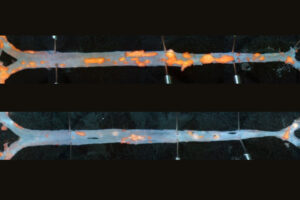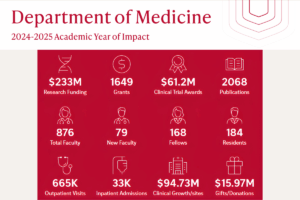The DOM Insider vol. 28 (Links to an external site)
February is Heart Health Awareness Month (Links to an external site)
February, a month traditionally associated with love, also brings attention to something equally vital: heart health. Recognized as Heart Health Awareness Month, February is dedicated to raising awareness about cardiovascular diseases (CVD), which continue to be the leading cause of death worldwide. Join us in highlighting the importance of heart health and taking steps to prevent CVD.
Immunotherapy reduces plaque in arteries of mice (Links to an external site)
Scientists have designed an immunotherapy that reduces plaque in the arteries of mice, presenting a possible new treatment strategy against heart disease. The antibody-based therapy could complement traditional methods of managing coronary artery disease that focus on lowering cholesterol through diet or medications such as statins, according to the findings of a new study led by researchers at the Lavine Lab at Washington University School of Medicine in St. Louis.
Patient Donation Made to HCM Center of Excellence
Layne Helmering and her family lost their son Nicholas last year to hypertrophic cardiomyopathy. A high school senior and captain of his debate team, Nicholas passed away suddenly in his sleep. In the wake of this tragic loss, Nicholas’s debate team held a fundraiser, coming together to raise awareness of HCM, a disease of the heart muscle that makes it harder for the heart to pump blood to the rest of the body.
Study Finds More Than a Quarter of Adults Worldwide Could Benefit from GLP-1 Medications for Weight Loss (Links to an external site)
Mass General Brigham researchers and collaborators from Washington University School of Medicine in St. Louis and Emory University’s Rollins School of Public Health pooled data from 99 countries and 810,635 adults to determine how many people worldwide may benefit from GLP-1 use. They found more than one in four adults would be eligible for GLP-1s for weight management, with women, older individuals, and low- and middle-income countries among the most eligible. These critical metrics could be formative in policy development to deploy GLP-1s around the world to tackle obesity and its comorbidities. Their results are published in a research letter in The Lancet Diabetes & Endocrinology.
Living with Marfan Syndrome, Marcy’s Journey After Aortic Dissection (Links to an external site)
When Marcy Lagarde, 42, of Raymore, Missouri, felt sudden excruciating pain in her left arm and had trouble lying down she
Headshot of 42-year-old Marcy Lagarde wearing sunglasses and white sleeveless top.
BJC patient, Marcy Lagarde, 42
knew something wasn’t right. Marcy has Marfan syndrome, a genetic condition that weakens the body’s connective tissue. Because she has been under the care of Alan Braverman, MD, a WashU Medicine cardiologist at Barnes-Jewish Hospital and world-leading expert in Marfan syndrome, she knew that the condition put her at an increased risk for cardiovascular issues—but she never expected to face one so suddenly.
2024-2025 Academic Year of Impact (Links to an external site)
As we begin the new year, I am filled with gratitude for the enormous contributions our faculty, staff and trainees have made, providing outstanding care for patients, performing groundbreaking research and delivering exceptional educational programs. This has not been an easy year. We have dealt with many challenges including a tornado that impacted many in our community, policy changes negatively impacting research funding and healthcare, budget restrictions and threats to our cherished values of diversity, equity and inclusive excellence.






